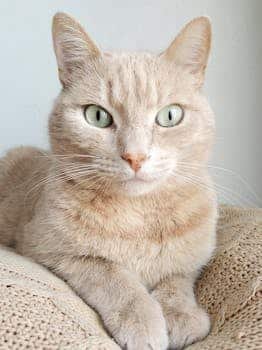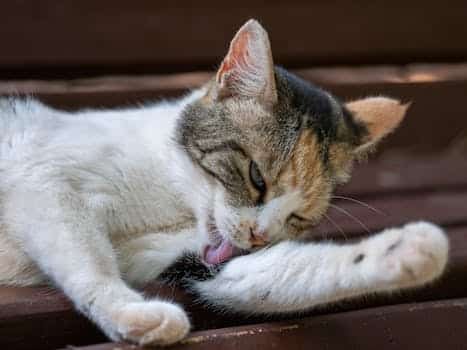Post Disclaimer
Catopedea shares information for educational and general interest purposes only. Our content is not a substitute for professional veterinary advice, diagnosis, or treatment. Always consult a licensed veterinarian for concerns about your cat’s health, diet, or behavior.
White cats are more than just a pretty coat. Many cat lovers have noticed unique personality traits in white cats that make them stand out from other felines. From affectionate cuddling to playful curiosity, white cats often display behaviors that seem almost human. In this post, we’ll explore everything you need to know about white cat personality, behavior, and how their traits might resemble human characteristics.
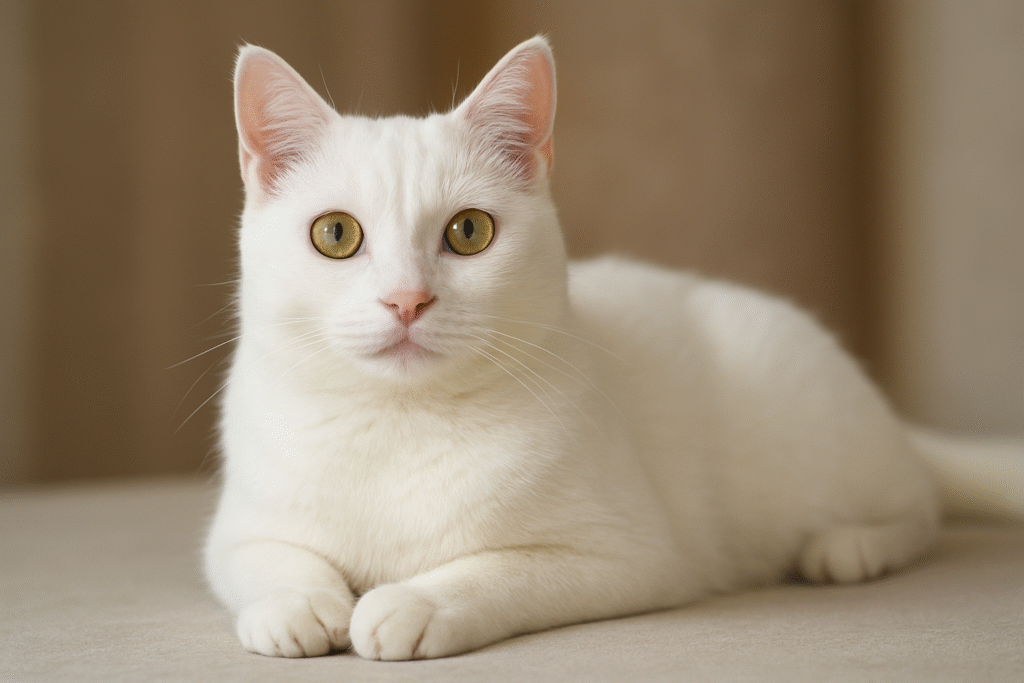
Introduction
When it comes to cats, personality isn’t just about breed—it’s also about individual traits and sometimes even coat color. White cats, with their striking appearance, often attract attention not only for their beauty but also for their intriguing behavior. Pet owners often wonder: Do white cats have a different personality compared to other cats? Studies and observations suggest they do, and many of these behaviors seem remarkably human-like.
White cats can range from quiet and affectionate to playful and mischievous. Their personality can be influenced by genetics, early socialization, and environmental factors, but many owners swear there’s a “white cat personality” that makes them special.
Understanding Cat Color and Personality
While every cat is unique, their coat color can sometimes provide subtle clues about personality tendencies. According to research shared by Meowijuana, certain coat colors have been associated with behavioral patterns:
- Black Cats: Often calm, affectionate, and adaptable. Many black cats are surprisingly easygoing and enjoy both interactive play and quiet relaxation. Some studies suggest black cats are less anxious in unfamiliar environments.
- Orange Cats: Generally social, outgoing, and extroverted. Orange cats tend to seek attention, enjoy being around people, and may even exhibit a playful, “clownish” behavior that entertains their owners.
- White Cats: Sensitive, sometimes more cautious, yet deeply affectionate when comfortable. White cats often have heightened sensory awareness, making them more attuned to changes in their surroundings.
Cat enthusiasts and pet psychologists suggest these tendencies result from a combination of genetics, early experiences, and environmental factors. While coat color is not a definitive predictor, observing your cat’s behaviors alongside their color can provide intriguing insights into their personality.
Tip: When choosing a cat, consider both coat color and behavior patterns, as they can hint at what kind of companion you’ll have.
The Unique Personality of White Cats
White cats are often described as gentle, intelligent, and mysterious. Their personality can be a mix of calm elegance and playful curiosity. Some key traits commonly observed in white cats include:
- Affectionate Nature: White cats often form strong bonds with their humans. They may curl up on laps for long periods, follow you around the house, or gently nudge you for attention. Their loyalty can sometimes resemble a dog’s attachment, offering emotional support when you need it most.
- Playfulness: Despite their serene appearance, white cats can be incredibly energetic. They enjoy chasing toys, climbing structures, and solving puzzles. This combination of calmness and playful bursts makes them both entertaining and comforting companions.
- Sensitivity: White cats can be more aware of their surroundings, reacting to subtle noises, changes in routine, or new people. This heightened sensitivity allows them to respond empathetically to human moods but also means they may need extra reassurance in stressful situations.
- Intelligence: Observations suggest white cats are problem-solvers. They may figure out how to open doors, retrieve hidden toys, or manipulate objects to achieve a goal. This cognitive ability makes them engaging and rewarding to interact with.
- Social Bonds: Many white cats create deep emotional connections with their owners. They might greet you at the door, “help” during daily tasks, or even mirror your moods, showing a level of emotional intelligence rarely seen in pets.
Pro Insight: White cats often demonstrate what owners describe as “human-like” behaviors, such as understanding moods, offering comfort, or anticipating your actions. These traits make them highly appealing to families and individuals seeking a responsive and emotionally aware pet.
White Cat Behavior Patterns
White cats often display behaviors that are not only fascinating but also insightful in understanding their emotional world. Common behavioral patterns include:
- Cautious Exploration: White cats may initially be reserved in new environments but gradually adapt once they feel safe. Offering a calm introduction to new spaces, people, or pets can help them thrive.
- Vocal Communication: Many white cats are expressive, using meows, chirps, and purrs to communicate. Listening carefully to these vocal cues can help you understand their needs, moods, and preferences.
- Routine-Oriented: White cats often thrive on consistency. Changes in feeding times, sleeping areas, or household routines may cause stress. Maintaining predictable daily habits helps them feel secure and confident.
- Affectionate Rituals: White cats frequently show trust and attachment through purring, head-butting, and kneading. These behaviors are their way of marking you as “family” and demonstrating comfort and love.
- Playful Mischief: White cats often enjoy interactive toys, puzzle feeders, or games that challenge their intellect. They may engage in clever antics, like hiding objects or inventing new ways to play, which makes them entertaining companions.
Insight: These behaviors often mirror human personality traits, such as sensitivity, loyalty, problem-solving, and empathy. Observing these patterns can deepen your understanding of your cat’s emotional intelligence.
Human-Like Traits in White Cats
One of the most intriguing aspects of white cats is how often their behaviors seem anthropomorphic. Many owners report noticing human-like qualities, such as:
- Empathy: White cats can respond to your emotions, offering comfort when you’re sad, stressed, or tired (WebMD). They may cuddle, nuzzle, or stay close to provide reassurance.
- Routine Awareness: They notice patterns in daily life and anticipate your habits, such as waiting by the door for meals or greeting you at certain times.
- Playfulness with Intention: Unlike random play, white cats often approach games with strategy, problem-solving, and purpose.
- Curiosity and Learning: White cats love exploring their environment and adapting to new experiences, much like a human child learning about the world.
- Affectionate Bonds: They often form a “favorite person” connection, following them around, engaging in shared activities, and showing loyalty akin to a companion animal.
Pro Tip: Embrace these traits by engaging in interactive play, providing mental challenges, and creating a predictable environment. Doing so strengthens the bond and brings out the best in your cat’s personality.
Breed Influence on White Cat Personality
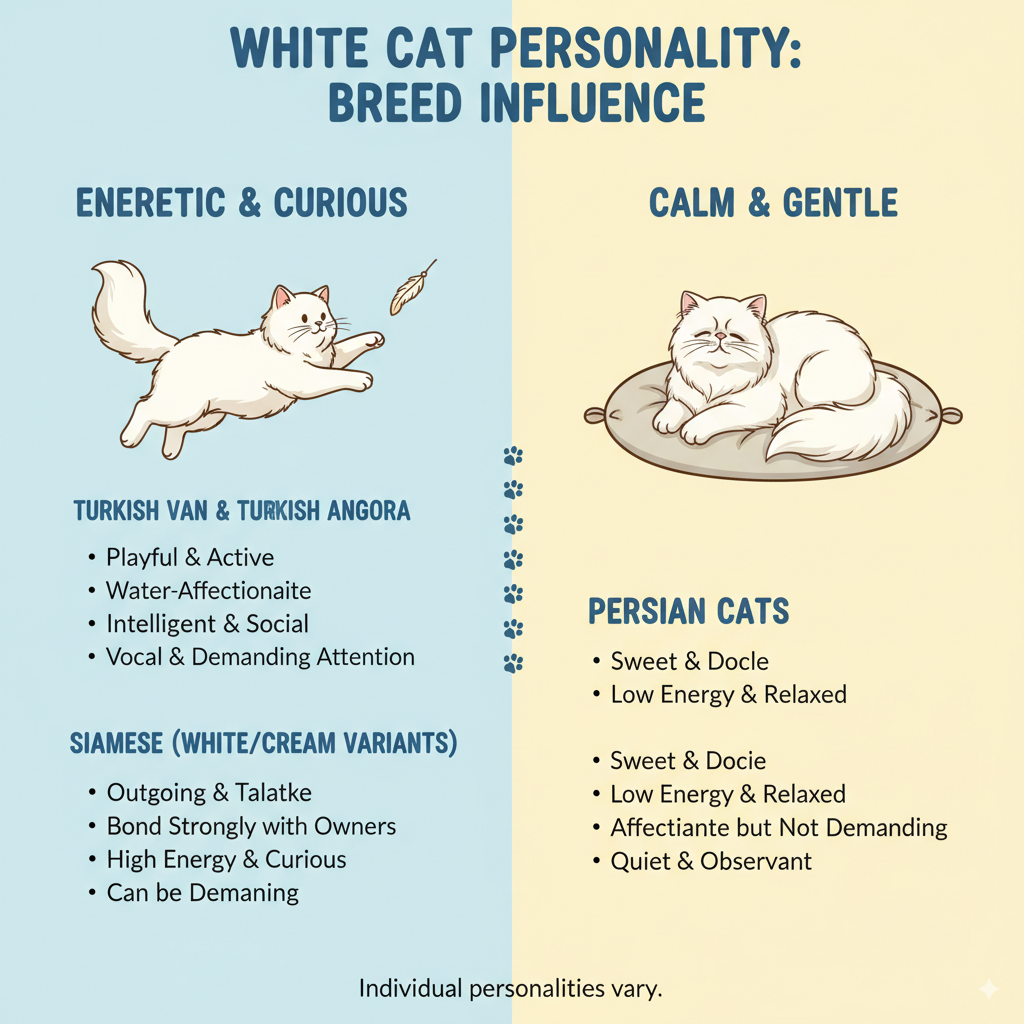
While coat color provides general insights, breed heavily influences personality. White cats from different breeds may show variations in behavior:
- Turkish Van and Turkish Angora: Intelligent, active, and social. These cats enjoy playtime, interactive games, and human companionship.
- Persian Cats: Calm, affectionate, and more sedentary. They thrive in quiet environments and enjoy lap time and gentle petting.
- Siamese Cats (White or Cream Variants): Vocal, outgoing, and interactive. They communicate frequently and often demand engagement from their owners.
Insight: Understanding both coat color and breed allows you to better predict personality traits and create a more harmonious environment for your cat.
Health and Personality: Are White Cats Different?
Some white cats, especially those with blue eyes, are more prone to congenital deafness. This condition can influence behavior:
- Reliance on Visual Cues: Deaf white cats may be more attentive to gestures, body language, and facial expressions.
- Stronger Human Bonds: Their reliance on human interaction can deepen emotional connections.
- Cautious or Playful Behavior: Some may display heightened curiosity or caution as they navigate the world using non-auditory senses.
Pro Tip: Deafness does not hinder personality. With patience and understanding, these cats can thrive, forming unique bonds and displaying highly empathetic behaviors (Feliway).
Tips for Caring for Your White Cat
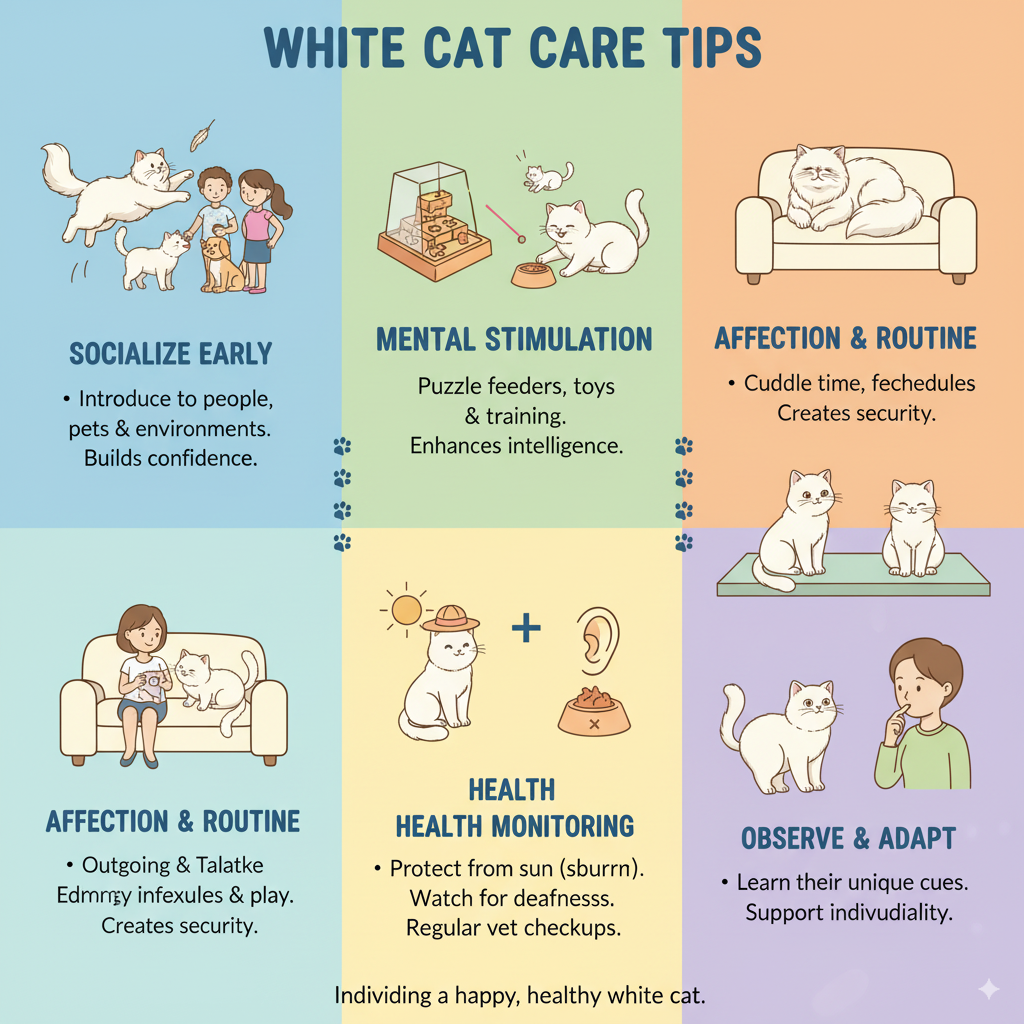
To nurture the best personality traits in your white cat:
- Socialize Early: Introduce them to various people, pets, and environments to build confidence.
- Provide Mental Stimulation: Puzzle feeders, interactive toys, and training games enhance intelligence and prevent boredom.
- Affection and Routine: Regular cuddle time, feeding schedules, and play sessions help them feel secure.
- Health Monitoring: Protect them from sun exposure (white cats can get sunburned), watch for deafness, and ensure regular vet checkups.
- Observe and Adapt: Each white cat is unique. Learn their cues and adapt your approach to support their individuality.
A well-cared-for white cat can develop deep, almost human-like bonds with their owners. They offer companionship, joy, and emotional support, making them truly remarkable pets.
Extra Value Tip: Pay attention to their favorite spots, toys, and times of day for affection they often communicate their preferences subtly.
FAQs
Are white cats rare?
Yes, naturally occurring white cats are less common than other colors, which often makes them highly sought after by cat lovers.
Does coat color affect cat behavior?
While not definitive, research indicates coat color can correlate with certain personality tendencies. White cats often display sensitivity, affection, and intelligence.
Are deaf white cats harder to train?
Deaf cats can learn routines and cues visually. They may even form stronger human bonds due to their reliance on non-auditory communication (Rover).
Can white cats be mischievous?
Yes, many white cats show playful or clever mischief, which can be entertaining and engaging for owners.
How can I enhance my white cat’s personality traits?
Early socialization, mental stimulation, and consistent affection help cultivate positive personality traits.
Conclusion
White cats are remarkable companions whose behavior and personality often mirror human-like qualities. From their affectionate nature to clever playfulness, they captivate their owners in unique ways. Understanding these traits helps you provide better care and deepen your bond.
If you’re considering adopting a white cat or already live with one, remember that their sensitivity and intelligence thrive best in a stable, engaging environment. Simple adjustments like adding cat trees and condos for climbing or maintaining consistent routines can bring out the very best in them.
Health-wise, keep in mind that white cats may need extra care. For example, some with blue eyes are prone to congenital deafness, a topic covered by the Cornell Feline Health Center. Protecting them from too much sun exposure is also important, as highlighted by the ASPCA. With awareness and proactive care, white cats can live long, happy, and deeply bonded lives.
For more insights into how coat colors connect with personality, explore our guide on Orange Tabby Cat Traits and discover what makes these cats just as unique.

